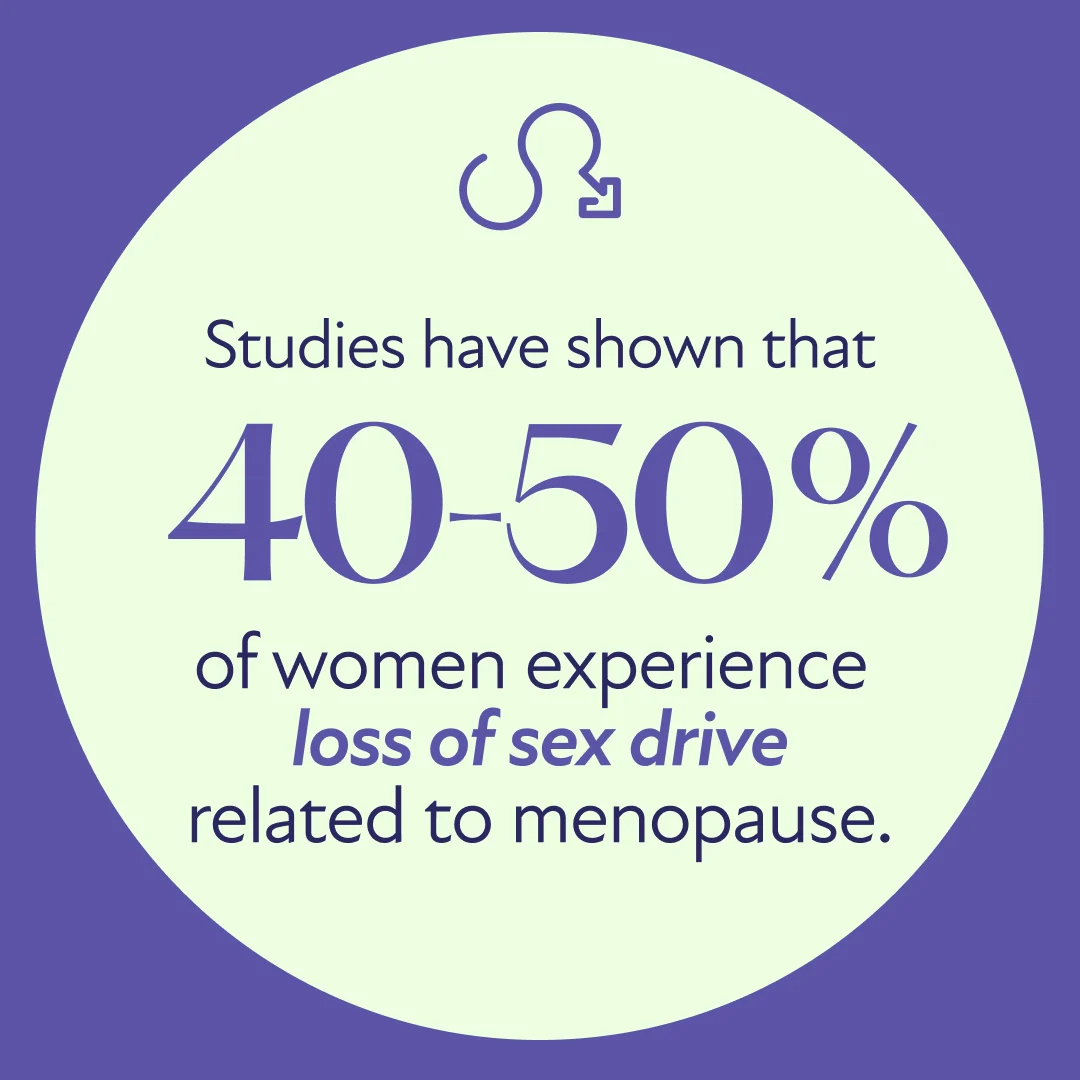The journey through menopause is marked by significant hormonal and physiological changes and may profoundly impact various aspects of life, including libido. The decline in estrogen levels during menopause can lead to a decreased interest in sex. It can also cause vaginal dryness and uncomfortable or painful intercourse. While some women may not notice a difference in their sexual desire, others might find it diminished. Studies indicate that about 40% of women going through menopause experience a reduced libido.1
Despite its prevalence, many women hesitate to seek help due to embarrassment or lack of awareness about available treatments. Menopause can alter what feels good sexually, but understanding these changes and knowing that various treatment options exist can be empowering. By effectively managing their sexual health, women can navigate this phase with confidence and continue enjoying a fulfilling sex life.

What causes decreased libido during menopause?
Satisfying sex depends on several elements: the presence of desire, the ability to get aroused, the absence of pain, and the capacity to reach orgasm. During the menopausal transition, estrogen levels fluctuate, and the accompanying bodily changes can make arousal difficult, intercourse painful, and orgasms unattainable.
All these changes affect sex drive in several ways:(1,2)
Brain Changes
Estrogen plays a key role in stimulating parts of the brain involved in sexual behavior, including areas that use dopamine. When estrogen levels decline during menopause, these brain areas are less active, which can lead to a decrease in sexual arousal.
Vaginal Dryness
The decline in estrogen levels during menopause causes thinning of the vaginal tissues, making them less sensitive to sexual stimulation. This reduction in estrogen also leads to decreased vaginal lubrication, resulting in vaginal dryness. Consequently, sex may become uncomfortable or even painful. This condition, known as dyspareunia, affects between 12% and 45% of women during menopause.
Reduced Blood Flow
A decrease in estrogen reduces blood flow to the genital area. This can make it harder to get aroused and reach orgasm, resulting in less enjoyable sex.
Psychological Factors
Menopause symptoms such as hot flashes, sleep disturbances, and mood swings can significantly impact energy levels and the desire for intimacy. Fluctuating hormone levels can also affect mental health, which, in turn, can influence libido.
High stress levels from juggling things like work, parenting, and caring for aging parents can further complicate this, leading to irritability or depression. Relationship issues and body image concerns can also impact mental well-being and sexual desire.
Recognizing the Symptoms of Decreased Libido
Libido encompasses both sexual interest and sexual enjoyment. Signs that menopause might be affecting libido include the following:2
Thinking less frequently about sex or having fewer sexual fantasies
Showing less interest in initiating sex
Experiencing difficulty in becoming aroused or reaching orgasm
Feeling discomfort or pain during sex
Losing interest in any type of sexual activity, including masturbation
Feeling sad or concerned about the lack of sexual activity or fantasies
Proven Treatments for Decreased Libido
There are ways to address decreased libido during menopause:
Lubricants and Moisturizers
Using an over-the-counter lubricant can alleviate discomfort during sex, while over-the-counter moisturizers can help reduce dryness. These moisturizers can be applied every few days for optimal effectiveness. It's important to note that non-water-soluble and silicone-based lubricants can degrade condoms, compromising their effectiveness in protecting against sexually transmitted infections (STIs).1
Hormone Replacement Therapy (HRT)
Systemic hormone replacement therapy (HRT) or localized estrogen therapy, such as creams, pills, or rings, can replenish estrogen levels, potentially enhancing sexual desire and arousal.
These treatments restore the natural balance of bacteria in the vagina (vaginal flora) and increase vaginal discharge by helping the vaginal lining (epithelium) divide and grow. They also promote the growth of small blood vessels (capillaries) and improve the health and development (maturation index) of the vaginal lining.
Other Medications
If HRT isn't an option, the doctor might suggest other medications for improving libido. Flibanserin (Addyi) is FDA-approved for low sexual desire, though not specifically for postmenopausal women. It may increase sexual satisfaction, but it can cause low blood pressure and fainting. Discussing its pros and cons with a doctor is essential.3
Bremelanotide (Vyleesi) is another medication approved by the FDA to treat low libido before menopause. It’s believed to activate melanocortin receptors in the nervous system, which play a role in regulating sexual desire. However, the exact mechanism by which it increases libido is not fully understood. Side effects may include increased blood pressure, which makes it unsuitable for individuals with a history of hypertension or cardiovascular disease.4
Lifestyle Changes
Certain lifestyle adjustments may help boost libido:5
Engaging in regular exercise
Quitting smoking or avoiding secondhand smoke
Reducing or eliminating alcohol and recreational drugs
Steering clear of products that irritate the vagina, like scented soaps and bath products
Maintaining a nutritious diet
Managing weight to improve overall well-being
Performing pelvic floor exercises to strengthen the muscles involved in orgasm
Therapy and Counseling
Cognitive behavioral therapy or sex therapy can assist in overcoming emotional and psychological barriers related to sex. Additionally, counseling can help manage depression, anxiety, and other mental health challenges that arise during menopause. For relationship issues, couples therapy can be beneficial, whether or not the problems are directly related to sex. This form of therapy can also encourage open communication about feelings, helping partners understand and support each other better.6
Experiencing decreased libido during menopause? Discover if HRT is right for you.
If you’ve entered the menopause transition and are struggling with decreased libido, you don’t have to suffer in silence. Take our brief menopause quiz to see if you’re an eligible candidate for HRT. Get started with Winona to take the first step toward feeling better.